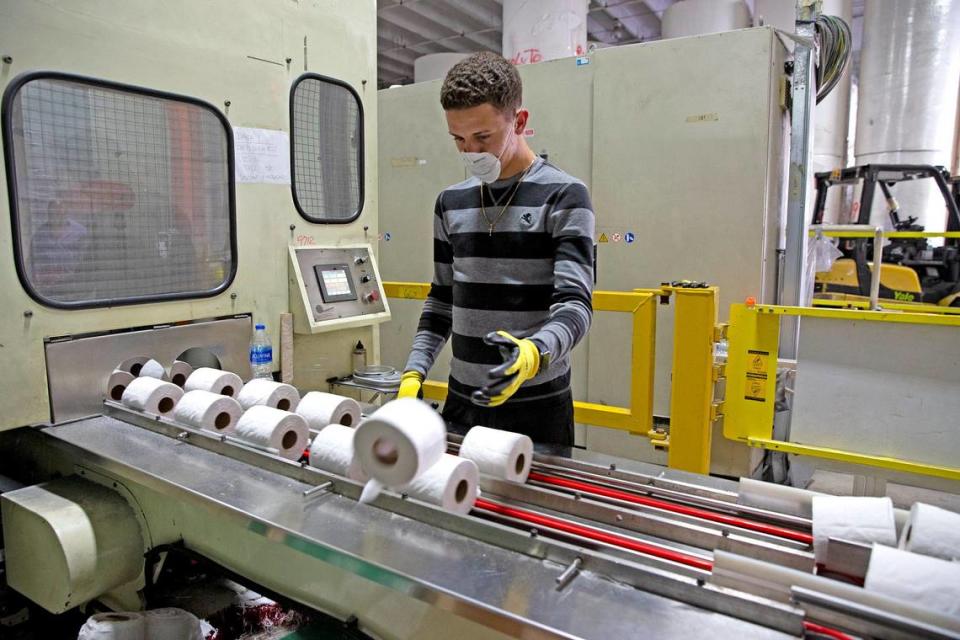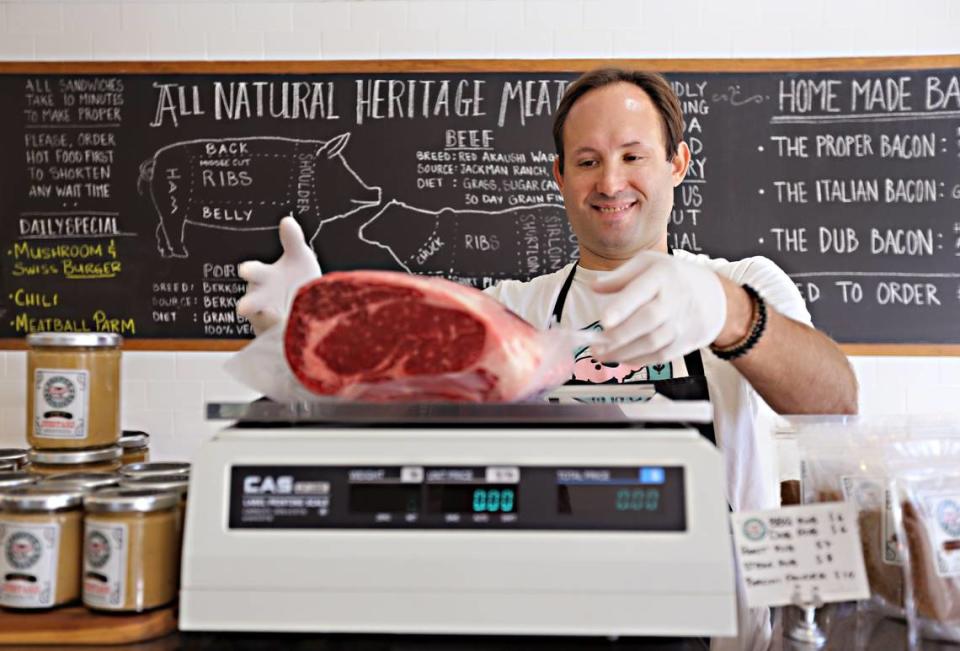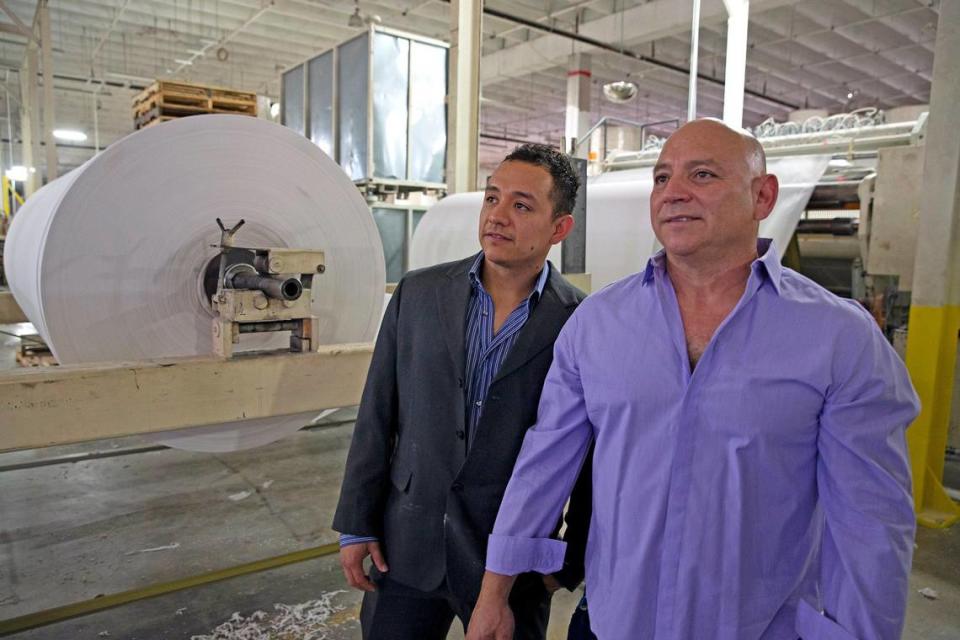Coronavirus is killing South Florida businesses. But some are busy — and hiring.
Even before the new coronavirus emerged in China, business at Juan Corzo Jr.’s South Florida Tissue Paper Co. was booming — so much so that the company expanded just a few years ago into a gleaming new plant in Miami Gardens.
So when the pandemic hit South Florida, the family-run company was ready to crank out a lot more of what quickly turned into one of the most sought-after products of the health crisis: Toilet paper.
Even as the pandemic has shut down entire economic sectors — including Miami-Dade’s lifeblood industry, tourism — some South Florida companies and businesses, like South Florida Tissue, are scrambling under rapidly changing conditions to cope with more demand than they’ve ever seen.
As panic-buying of sanitary tissue cleaned out store shelves, Corzo was able to quickly ramp up production in response to exploding orders. The company went from producing around 120,000 rolls per day to 220,000, hiring a dozen extra workers and adding shifts to work virtually around the clock.
It’s still not enough. Demand is so relentless that orders are backed up three to four weeks, he said.
Need a job? Here are the companies hiring amid the coronavirus outbreak
“If we had the machinery, we have enough orders to make five times that,” Corzo said. “If you’re going to quarantine, the top essentials are water, food — and a lot of people share the same opinion — toilet paper would be the third.
“Everybody is unsure how long this is going to last. So nobody wants to run out of toilet paper.” His company is charging the same price as it did before the virus hit.

The wildly uneven effects of the coronavirus pandemic mean that demand for some essential goods and services across South Florida has soared — and so has hiring by the companies that provide those. And while the economic impact doesn’t begin to make up for the loss of hundreds of thousands of jobs and the closure of hundreds of shops, bars and restaurants, the small boom represents a beacon of light in an otherwise dark economic landscape.
Those busier than ever include the obvious: grocers like Publix, national pizza delivery chains like Domino’s and online retailers such as Amazon. The Wall Street Journal has reported that “a consumer frenzy” by people staying close to home has sharply boosted demand for delivery services and brought increased web traffic for general discount merchandisers such as Target and Walmart.
All those big entities are frantically putting out calls looking to hire thousands of new workers to stock shelves, run cash registers, drive delivery trucks and boost staffing at production and distribution facilities that are running fill tilt across South Florida and the rest of the country.
Panic-purchasing has even extended to sellers of firearms and ammo across South Florida whose shops have been cleared out of deadly merchandise.
SUPERMARKET SURGE
Lakeland-based Publix would not comment on soaring sales, saying it doesn’t disclose financials. But the company has responded by announcing it’s hiring thousands of associates by the end of March to fill positions in stores and distribution centers.
In Miami-Dade, local supermarket chains such as Sedano’s and Milam’s are also plainly sharing in the rising demand as shoppers stock up on — and sometimes hoard — staples and fresh food, with shelves periodically emptying of products such as bread, pasta, rice, milk, chicken and ground beef, not to mention TP and cleaning supplies. Sedano’s said it’s hiring 400 workers laid off by the Versailles and La Carreta restaurant chain. The five-store, family-run Milam’s said it, too, is hiring.
The run on fresh food has also been good for some small, local specialty shops. At Proper Sausages, a high-end butcher in Miami Shores, customers who in the past would shop mainly for special occasions are now buying regularly, owner Freddy Kaufmann said. Because shuttered restaurants are no longer buying, he can now get more high-quality meats, allowing him to expand his range of offerings.
“We’re set up to do the one thing people want to do now, which is to stay home and cook,” Kaufmann said.

When shutdowns began with the spread of the virus, he said, “we got bombarded.”
“We were watching people buy more than usual, as if they were stocking up for a long period of time, and concerned they would not have another opportunity,” Kaufmann, who employs a team of eight people, said. “We’re telling people we are always going to have stuff. There is plenty here and it’s always coming in.”
To create the necessary social separation and also to better manage the surge, Kaufmann instituted a new purchasing regimen: The shop is, for now, open for delivery and streetside pick-up only. And orders must be placed by 5 p.m. the day before.
“It’s a lot for us to serve the community what they need and keep everyone’s physical and mental health,” he said. “We’re all in this together, after all.”
But the surge has overwhelmed some local retailers not set up to handle the volume of demand prompted by coronavirus. Wild Fork, a chain purveyor of frozen meats and seafood, shut down online orders and home delivery. Its website blames “severe disruption” to its online operation brought on by the pandemic. In a statement, the company said it’s working to restore those services soon.
Wild Fork’s stores remain open and operating normally. On Thursday, its Coral Gables location was fully stocked with a wide variety of meat and seafood, though it was limiting sales of in-demand chicken and ground beef to two packages per customer.
Another service that ships directly to customers’ homes, Broward County-based Chewy, the fast-growing online seller of pet food and meds, said in a statement it’s working to meet “higher demand” without quantifying the amount.
““Pet parents across the country are relying on us to deliver essential food supplies and medication for their beloved pets. To meet the higher demand, we are working quickly and diligently to adapt our practices and policies in a way that safeguards our team members’ health, as well as our customers’ experience,” Chewy said.
OUT OF SIGHT
Others experiencing soaring business demand may not be so obvious, mainly because their work is done online and out of public sight.
For some companies in South Florida’s under-the-radar tech sector, coronavirus has been a boon. That includes those providing remote doctor consultations as well as others that support virtual conferencing and secure networks that facilitate having a workforce at home.
Fort Lauderdale-based Citrix, which provides teleworking services, has said it’s seeing more demand. Executives were unavailable because the publicly owned company is in a “quiet period” before reporting its financials, a spokeswoman said. But the increased desirability of its products and services was underscored when U.S. Sen. Kelly Loeffler, R-Ga., came under fire for dumping millions of dollars in stocks after a closed-door briefing on the epidemic. Loeffler then bought shares in Citrix worth between $100,000 and $250,000.
As employers send office workers home to telecommute, Citrix said in a statement issued before the quiet period, it’s extending services to new and existing customers looking to rapidly expand their networks and the number of employees working remotely. Among its offerings is a new, low-cost entry-level version of a digital workspace solution for small businesses, Citrix said.
“A growing number of customers and organizations are turning to Citrix for advice and support to enable secure remote-work initiatives that can ensure the safety and productivity of their employees and to maintain ongoing business operations throughout this evolving global crisis,” Citrix said.
There’s one sector that may actually be seeing long-term gains from coronavirus: Companies that offer telemedicine services. As many if not most doctors’ offices cancel or postpone face-to-face appointments, they are turning to virtual consultations whenever possible. And so are patients worried about potential exposure to the virus in physician’s offices, urgent care centers or hospital emergency rooms.
As many try telemed for the first time, often through their insurers or workplaces, they’re finding they like the convenience, the speed and ease of making appointments, and the insulation from possible infection, said Charles Jones, chairman of MDLIVE, which is based in Miramar.

“We’ve had really laudatory reactions,” Jones said. “It’s rewarding that telehealth can treat so many patients, and treat them safely.”
Past demand for tele-med has been mainly seasonal, peaking during flu season and tapering off around this time as it wanes, Jones said.
But the number of virtual doctor “visits” handled through MDLIVE has instead spiked from 4,000 a day to 7,500 with the epidemic, Jones said. Though some calls do concern coronavirus, the vast majority of those consultations involve standard medical issues, he said. Typically, patients wait no more than a few hours for a doctor, though that lag has grown some given the demand spike.
In response, MDLIVE has recruited more doctors, increasing the availability of physicians by nearly a third, Jones said. He said the company believes demand for its services will only increase as the pandemic accelerates. He expects it may have to recruit even more physicians, representing as much as a potential 50 percent increase over its pre-coronavirus availability.
Because 40 percent of patients use the service again, Jones believes MDLIVE is likely to retain much of that new business permanently.
Moreover, Jones noted, MDLIVE’s proprietary tech platform proved itself by seamlessly expanding to handle the additional consultations without going down.
MIXED PICTURE
For some other South Florida companies, though, response to the pandemic has been a mixed picture. Even the sharp increase in demand for takeout pizza does not guarantee restaurants can ride out coronavirus.
Popular Broward-based pizza chain Anthony’s Coal-Fired Pizza, which had been thriving and expanding before the coronavirus began spreading, has seen expanded demand for its already brisk takeout business, a spokeswoman said.
But the loss of in-restaurant dining at many of its 66 locations as cities and counties issue shutdown orders has cut deeply, Anthony’s chief marketing officer Katy Knight said.
Management has streamlined the takeout menu and furloughed staff while trying to keep as many people employed as possible, Knight said.
“It’s been a significant impact,” she said. “We’re trying to do everything we can to stay open and to protect as many team members as we can.”
Even as they work to meet spiking demand, some South Florida company officers say there is no telling how long it will last — whether food and staple purchases will drop off once people have stocked up or run out of storage, or if the need for teleconferencing will drop as mandatory stay-at-home orders are eased.

Some say that as new customers get to know their goods and services, they will come back for more even as the crisis wanes — even for toilet paper.
At South Florida Tissue, even before coronavirus, production was already growing at the company, founded in 1997 as an expansion of a family business in Guatemala, Corzo said. The company’s products are sold as private store labels and under its own Excellence and Soft brands.
Now his workforce is up to 60 people from 45 previously, and he’s confident that once people come to know there’s a locally made product that can be delivered quickly for less, given lower freight costs, they’ll be back for more — though he discourages hoarding.
“We’re getting a lot of new accounts, new customers, and a mix of our existing customers ordering more than they ever have before,” Corzo said. “It’s been good for business. The downside is the additional work. But working overtime is not new to us. We love what we do.”

